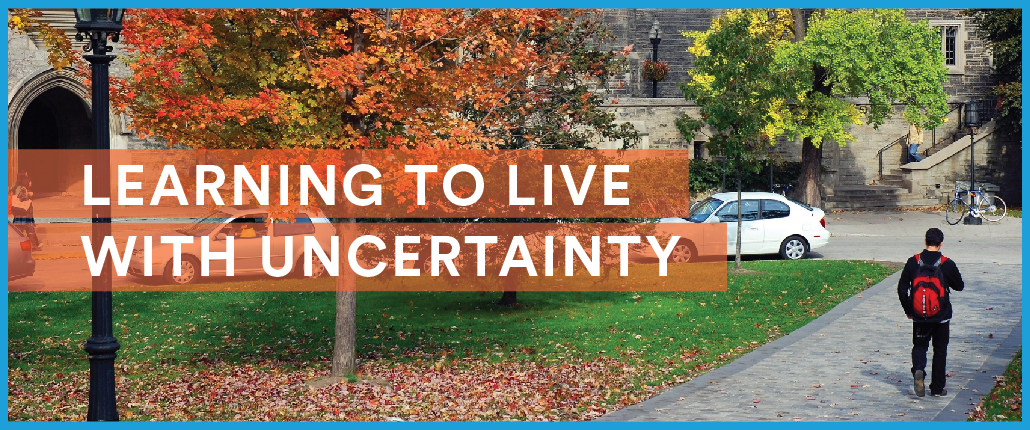
Learning To Live With Uncertainty
College students have become used to their plans constantly changing. After most campuses shut down in Spring 2020 due to Covid-19, colleges now seem ready to have students return for Fall 2021. But many students say they are receiving emails from their schools that offer sometimes confusing information about what campus life will be like this fall. While some students are able to roll with this, many neurodivergent students find this new reality to be anxiety provoking and stressful. Parents too find themselves overwhelmed as they try to support their young adult children.
As we are currently living in an uncertain time, it is understandable that neurodivergent students are feeling very anxious right now about what life will be like this fall semester. Anxiety is often defined as the fear of the unknown. It is a feeling of worry, or nervousness, brought about by a stressful event or an uncertain outcome.
Anticipatory anxiety specifically refers to the anxiety that comes from thinking about what may happen, usually with a negative perspective. This too is understandable as many young people may still feel traumatized with how quickly their schools, and the whole country, shut down in Spring of 2020. It is reasonable to feel worried about that possibility happening again.
So while we all know that life often doesn’t go according to plan, life does indeed go on. And we have to adapt. So while it can be overwhelming to think about the future, there are things we can do to feel a sense of control.
First, recognize and label the emotion as anxiety.
By naming the emotion you are experiencing, you can allow yourself to process the feeling. Be aware that the headache, stomach ache, or sense of fatigue that you may be feeling are all ways that your body is experiencing anxiety. Some people find it helpful to verbally label the emotion for themselves. Another good strategy is to document how you are feeling in a journal. When you are feeling better, it can be very empowering to go back and read old entries to remind yourself how far you have come.
Second, try a grounding technique.
These are strategies that help you to control your emotions by forcing your attention away from anxious thoughts and refocusing on the present moment. One such technique is called “5-4-3-2-1.” This strategy helps you to purposefully take in the details of your surroundings using each of your senses. You start out by noticing 5 things you can see, such as a photo or painting on the wall, or an object in your view. Next is noticing 4 things you can feel such as the shirt you are wearing or the texture of the chair you are sitting on. After that, you notice 3 things you can hear such as the ticking of a clock, or the sound of a dog barking. Next is 2 things you can smell such as the scent of a candle, or the smell of food. And last, is 1 thing you can taste. This might be gum or a mint, or a cup of coffee. You can go through the 5 items aloud or silently to yourself. Usually by the time you complete all 5 levels of this technique, you are feeling a bit calmer and more present.
And third, allow yourself to accept that life, as we knew it, has changed.
The Covid-19 virus has seeped into every facet of life and no one is invulnerable. But we can take steps to protect ourselves and we can follow the advice of healthcare experts.
As for starting or returning to college, it may help to know that you are not alone and that many students are going through the same experience. For some people, knowing their options may be helpful. Find out if your college has an online option that will allow you to change your mind about campus life. It may decrease your anxiety if you know you can choose to leave your college dorm or apartment and finish the semester at home.
Remind yourself of the phrase, “This too shall pass.” This means that life will eventually return to normal. It may be a new normal, but it will return.
In addition, taking good care of yourself helps you to better cope with anxiety. Focus on your health by getting enough sleep, exercise, eating well, and making time to see family and friends. Staying busy can also help. Start or continue your hobbies, try something new and maybe out of your comfort zone, and make plans to go outdoors as much as possible.
And for some folks, it may be helpful to talk with friends, parents, your life coach, or therapist about how you are feeling. There is no shame in feeling anxious – everyone can understand. Asking for help shows a lot of strength.

Jeri Rochman, JD, MS
Jeri Rochman, JD, MS, is the Advance LA Director of Community Outreach, a Life Skills Coach, National Board Certified Counselor and Certified Parent Educator. Interested in learning more about Advance LA’s services?